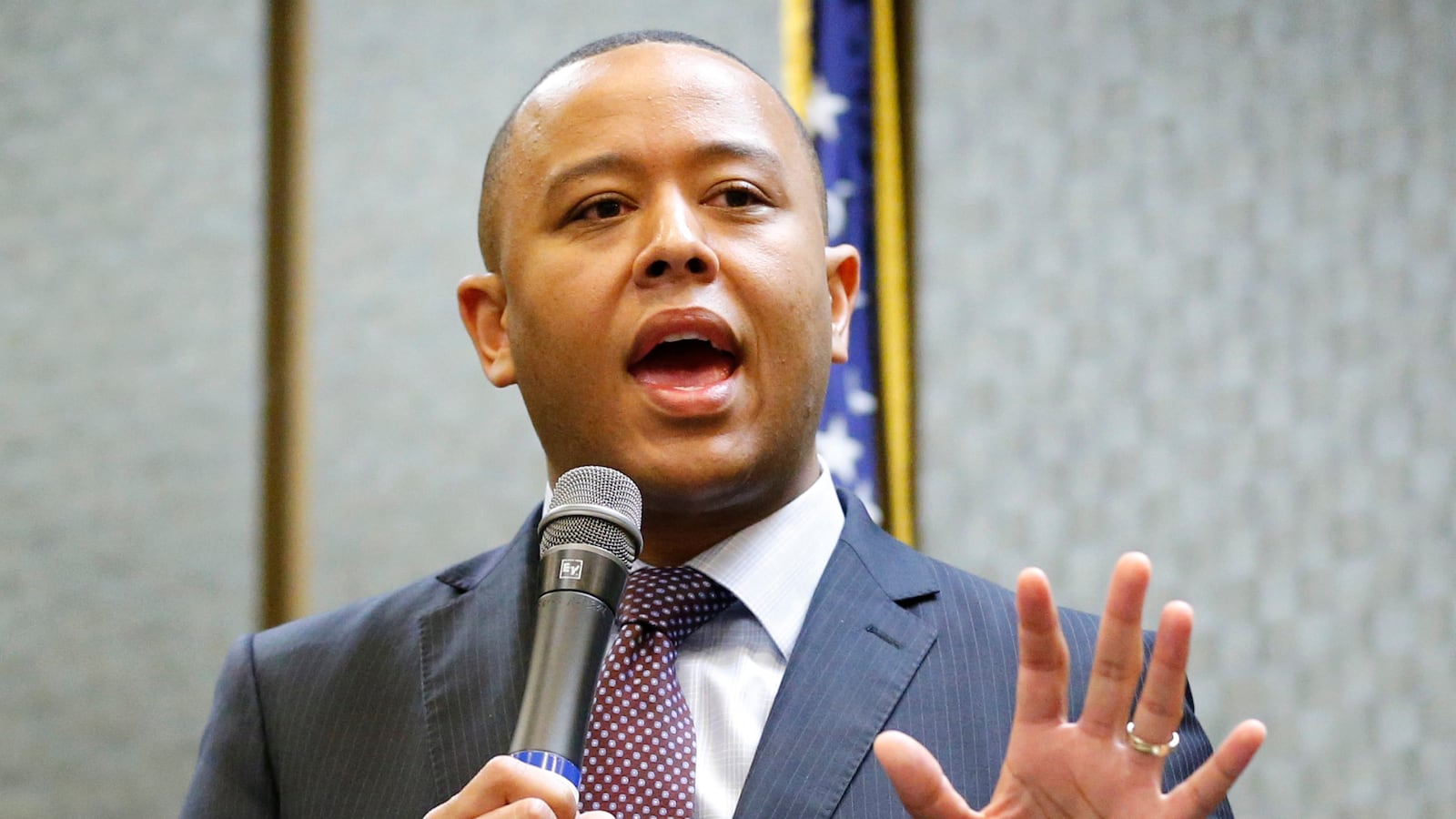T.W. Shannon doesn’t talk about race. He doesn’t bring it up on the campaign trail. But whether he likes it or not, the part-black, part-Chickasaw Oklahoma state House Speaker seeking the Republican nomination for U.S. Senate will be defined by the color of his skin.
Shannon is the youngest House speaker in Oklahoma history, and the first African-American House speaker in Oklahoma history. But it’s the latter that has real political weight, and what he’s remembered for—even if he doesn’t make a point of emphasizing it.
"As an Oklahoman, I am proud that we have an African-American—first ever—as speaker of the state House," former Republican Oklahoma Gov. Frank Keating told The Daily Beast, without having been asked about race (Keating hasn’t endorsed either candidate and also spoke highly of Shannon’s main primary opponent, James Lankford). “In the case of Shannon, to be one of two African-Americans [Republicans] in the U.S. Senate… that would be a great statement for civil rights and civil justice."
Polling shows Shannon lagging behind Lankford, but if Lankford doesn’t get a majority at the polls in the seven-way race Tuesday, it’s likely the two will proceed to a runoff.
Should Shannon survive Tuesday’s election, secure the nomination in a runoff, and be elected to the Senate, he will be catapulted almost instantly to national fame, as the third African-American currently in that body and a popular tea party symbol.
Tahrohon Wayne Shannon’s rise to competiveness against Lankford, a two-term Congressman with a similar ideological temperament, was aided by powerful endorsements from national tea party figures like Sarah Palin and Sen. Ted Cruz. Last month, Palin made a not-so-subtle point that illustrated one of the reasons why Shannon could spring to broader prominence.
“His name alone! … The Democrats accuse us of not embracing diversity? Oh, my goodness, he is—he’s it. He is the whole package,” exclaimed Palin at a rally for Shannon in Oklahoma, according to The New York Times. There’s no doubt Shannon’s supporters also have ideological reasons to support him, and the candidate himself said in a statement that he doesn’t see the campaign in racial terms.
“I think the real dynamic here is between two candidates who have a very different approach on the issue of spending and our national debt,” Shannon said.
But when Republicans political operatives are frank, the broad influence of race on the campaign is undeniable, if unintended.
"This would be a lot easier race for Lankford if Shannon were white,” a senior Oklahoma political aide who hasn’t taken sides in the race said. “A lot of people… recognize that it would be good and welcome diversity in the Republican Party to have someone like Shannon [in office].”
The consideration of Shannon’s race is more consequential for tea party figures on the national level—consider Palin’s remarks—than on the ground in Oklahoma. Viewed as a potential addition to a group of Republicans and tea partiers where white lawmakers are plentiful, Shannon’s race becomes more relevant.
“Let's be intellectually honest and historically honest,” said Prof. Keith Gaddie, who teaches political science at the University of Oklahoma. “Since the 1990s, when Colin Powell first came to prominence… the Republican Party has been looking for people of color to frame and push forward their politics. We're seeing it with Tim Scott, we're going to see it with T.W. Shannon. Republicans get so few candidates of color… when they come forward, particularly charismatic ones, they get pushed forward as a symbol of diversity.”
But locally, race doesn’t play into voter thinking—at least explicitly. 2012 census data show that the Sooner state is 75.5 percent white, 7.6 percent Black and 9 percent American Indian. But despite the demographics of the state, Oklahoma had no qualms electing African-American politician J.C. Watts to statewide office in 1990, then sending him to Congress for four terms.
Pollster Bill Shapard, who has conducted multiple surveys on this race for Oklahoma news outlets, said he has not "seen any indication that race is playing any kind of role whatsoever" among the Republican primary electorate, even if he does recognize the inevitable role that race will play in Shannon's future.
"If Shannon was elected, he would play a greater role… Oklahoma would greatly benefit from him winning… he's half-black, he's half-native American," Shapard said. "He would play a larger role on the national stage. I don't think James Lankford will [play as large a role]."
Lankford’s campaign doesn’t accuse Shannon of playing the race card, and like Shannon’s campaign, denies the relevance of ethnicity to voters in the Oklahoma primary.
"That's not an issue that comes up on the campaign trail,” a Lankford aide said. “We're a very red state. We've got a very conservative base… it doesn't matter what the color of your skin is, it matters if you know the issues."
Still, the Oklahoma House speaker has a long slog before him. Lankford's campaign thinks there's a chance that the congressman could win it all tonight without leading to a runoff. Shapard, the pollster, predicts Lankford will just squeak by with a narrow majority. Even if Shannon were to lose to Lankford, it's important to note that defeated Republican politicians have managed to leverage their campaigns into influence—consider Palin, or Mike Huckabee, for example.
Shapard’s latest poll, conducted late last week, has Lankford up eight percentage points, at 43 to 35 percent. A poll Shapard conducted a week ago had the two separated by just three percentage points.






